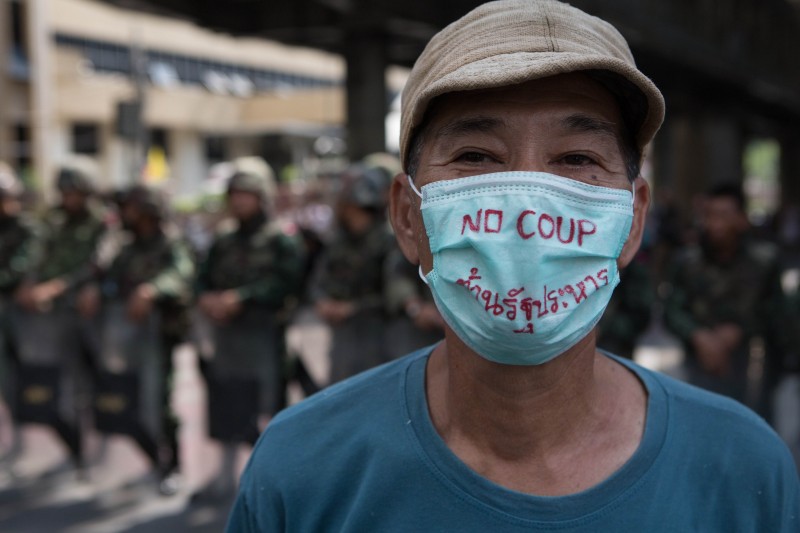
A protester stands in front of a line of soldiers in Bangkok while wearing a mask bearing the message ‘No coup’. Photo by Atiwat Silpamethanont, Copyright @Demotix (5/25/2014)
General Prayuth Chan-ocha of the Royal Thai Army has been given a royal endorsement to lead Thailand’s coup regime but many citizens continue to mount protests despite an army directive against the gathering of five or more persons in public places.
The night curfew has been slightly eased and some of the detained leaders like former Prime Minister Yingluck Shinawatra have been freed already. Although the Junta continued to summon academics, journalists and other dissenters to report to the army.
As mainstream media remained under tight regulation, information and other news reports about the coup are shared mainly via the Internet. Since day one of the martial law declaration on May 20, 2014, the army has consistently threatened Internet users about using the social media to undermine the regime.
Hundreds of websites have been blocked already for being ‘inappropriate’ and local Internet providers are asked to filter harmful content. The army has vowed to punish netizens who are committing illegal online acts.
One of the popular reactions of Thais during the coup is the taking of selfie photos with soldiers deployed in the streets of Bangkok, the nation’s capital. The Twitter hashtag #CuteSoldierBoy even became popular in Thailand. Many were alarmed to see civilians happily posting photos of soldiers carrying high powered guns.
But many residents are not afraid of military deployment in the city and this was expected after half a year of intense street clashes between government supporters and protesters. This is also the 12th successful coup since 1932.
But the coup selfies should not be interpreted as a sign that Thais are supportive of the military intervention. They may not be afraid of soldiers but it doesn’t mean that they are not opposed to the Junta. The selfies were taken at a time when the army was threatening to censor social media.
Perhaps afraid of being tagged as a dissenter, some Thais opted to snap selfies with the soldiers while being silent about their sentiments about the coup. But the selfies succeeded in informing the whole Thailand and the rest of the world that the army has indeed taken over and replaced the civilian government.
Through the selfies, we learned that soldiers have been deployed near train stations, malls, major intersections and government offices. While TV stations were shut down (for two days they broadcast only patriotic songs from the World War II era), social media and in particular coup selfies provided the latest information about the coup situation in Thailand.
Are “selfies” a sign of a military coup in Thailand? http://t.co/Ga9i2rhAWD #c4news pic.twitter.com/LqOhDj6YrI
— Channel 4 News (@Channel4News) May 20, 2014
Newsy or a Doozy – ‘Aint no selfie like a Thai coup selfie'… @graciewtaylor pic.twitter.com/H2PIuZcKWT
— George FM Breakfast (@GRGFMBRKFST) May 27, 2014
New craze for wedding photos in #Thailand. Taking pictures with soldiers and armoured vehicles #ThaiCoup pic.twitter.com/iwM7xzkXNV
— Richard Barrow (@RichardBarrow) May 27, 2014
Tourists pose with soldier for pics at thaepae gate chiang mai. Very quiet. Usually a bustling Sunday market here. pic.twitter.com/IJhNPVIgmv
— Fergal Barry-Murphy (@fergalbm) May 25, 2014
Then the selfies showed Thais expressing condemnation of the coup. Journalists started posing near soldiers to protest the curtailment of free speech. Students dared to go near army troops to demand elections. These few and scattered selfie photos inspired others to join several protests across the country.
@PravitR at Army Club Thewes turning himself in. How many other journalists will follow? pic.twitter.com/kgX8Dza0ZP
— Jonathan Head (@pakhead) May 25, 2014
one onlooker taking part in an anti-coup protest in Khon Kaen #ThaiCoup #Thailand #Coup2014 pic.twitter.com/0jXh0gKJLE
— The Isaan Record (@isaanrecord) May 23, 2014
The protests, though small, undermined the authority of the Junta prompting the army general to issue a warning against the dissenters:
Please be aware that from now on many kinds of action will be tried in the military courts – offences like lese majeste, where the law is very clear.
There must be no more criticism of soldiers or the police, Everyone is obliged to contribute to national security and to start following the law. When everyone disrespects the law and has no respect for officials, it has impacts at the political level, the administrative level, and in transparency.
I don’t want to argue with anyone, I just want to make my intentions clear. I can achieve everything as long as the people are satisfied to help me. Don’t criticise or create new problems, it's useless.
The selfie protests became popular and this probably inspired coup supporters to be more aggressive in showing solidarity to soldiers. We saw Thais giving flowers, bottled water, and food to soldiers and many carried placards describing the army as their hero.
Pro-coup demonstrators rally in front of 1st Infantry Regiment HQ in Bangkok today #ThaiCoup pic.twitter.com/6Q3AV7UG1K
— Khaosod English (@KhaosodEnglish) May 27, 2014
Pro-coup gathering at Bangkok's Democracy Monument. “We support army” #ThaiCoup pic.twitter.com/76mfzUY8h7
— Amy Sawitta Lefevre (@MimiSawitta) May 27, 2014
บรรยากาศหน้ากองบัญชาการกองทัพบก มีเสียงตะโกน “ทหารสู้ๆ” pic.twitter.com/aS6Kd6OZkH
— Phattanan Songchai (@phattanantv9) May 27, 2014
Another trend is the posting of tourism activities and tourist destinations in Thailand to show the world that the country remains peaceful and many areas are not affected by the coup.
A friend sent me this pic of tourists at Phrom Thep Cape in Phuket. She labelled it “What Coup?” #Thailand pic.twitter.com/VZwcLxgar5
— Richard Barrow (@RichardBarrow) May 27, 2014
#Thailand – RT @Freeszone: Koh Samet looks peaceful as well, no military pic.twitter.com/OuGNOfppPR
— Richard Barrow (@RichardBarrow) May 27, 2014
There is reason to be less worried as long as we see Thai coup selfies on our timelines. Because it means Thais are still free to post online whether it is the picture of a cute soldier or a reporter denouncing the coup regime.







7 comments